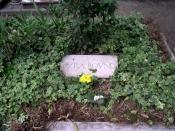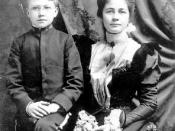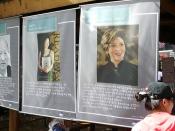Bootie Call at Cho-fu-Sa
"The River-Merchant's Wife: A Letter," by Ezra Pound is not only a letter from a woman to her husband, but is also a narrative of a young woman's sex life. It tells of a river merchant's wife's feelings on sex throughout her life and marriage. It also shows how her views change with time and circumstances. The poem starts with her early childhood, and then goes quickly into marriage, and ends when her husband has to go away on business. Never once does the poem mention love, but it does elude to the fact that sex is better when some feeling is involved.
Line one and two of the first stanza state, "While my hair was still cut straight across my forehead / I played about the front gate, pulling flowers" (1-2). The straight bangs and flowers are representing the youth, innocence, and purity of the still single narrator.
The narrator also views the rest of the world and her husband-to-be through this innocence: "You came by on bamboo stilts, playing horse, / You walked about my seat, playing with blue plums" (3-4). These lines seem to paint a picture of a very carefree childhood and a detachment from the ways of the world. The narrator shows no feelings of love, lust, or even moderate attraction to the boy other than the innocent and simple companionship of childhood when she goes on to say, "And we went on living in the village of Chokan: / Two small people, without dislike or suspicion" (5-6). It is apparent that the narrator is happy with her own microcosm. Her innocence prevents her from thinking that anything exists outside of her world of flowers and blue plums. In her world sex does not even exist.
The breech of...


